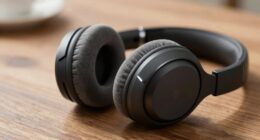When evaluating the age requirements for cochlear implants, it is evident that age should not be a barrier to accessing this life-changing technology. While considerations such as developmental stages and general health must be considered, the debate on whether age should be a determining factor in eligibility remains ongoing.
With advancements in surgical techniques and rehabilitation, the boundaries of age for cochlear implantation seem to blur, prompting a deeper examination into the factors influencing this pivotal decision.
Key Takeaways
- Anesthesia tolerance and overall health are key factors in determining candidacy.
- Implanting the worse ear can lead to better outcomes, especially in older patients.
- Duration of hearing loss and the ear implant decision are crucial considerations.
- Chronological age alone should not be the sole determinant of cochlear implant candidacy.
Understanding Cochlear Implant Candidacy Criteria
Factors that determine eligibility for cochlear implant candidacy include biologic age, anesthesia tolerance, duration of hearing loss, and overall health status. Cochlear implant candidacy is not solely based on chronological age. An individual's ability to tolerate anesthesia is crucial for successful surgery, while the presence of moderate or severe heart/lung disease may impact candidacy. When considering elderly patients for cochlear implants, the duration of hearing loss and whether to implant the worse or better ear are significant considerations. Some surgeons opt to implant the worse ear for better outcomes, particularly in older patients who've been deaf in one ear for an extended period. Understanding these criteria is essential for evaluating individuals seeking cochlear implants, as it influences the likelihood of a successful outcome, especially in older patient populations.
Age-Related Considerations in Cochlear Implantation

Age-related considerations play a crucial role in the evaluation and decision-making process for cochlear implantation in elderly patients. When determining eligibility, factors such as the duration of hearing loss and whether to implant the better or worse ear must be carefully assessed. Some surgeons opt to implant the worse ear, as it may lead to improved outcomes, especially in older individuals who have been unilaterally deaf for an extended period. Successful cochlear implantation in older patients can result in various benefits, including delayed mental decline, enhanced quality of life, and increased independence.
| Consideration | Importance |
|---|---|
| Duration of Hearing Loss | Critical factor in evaluating candidacy |
| Better Ear | Decision whether to implant the better ear |
| Worse Ear | Some surgeons prefer implanting the worse ear |
Exploring Benefits of Cochlear Implants by Age
Exploring the benefits of cochlear implants by age reveals significant enhancements in speech perception and music understanding across recipients of all ages. Both younger and older individuals who undergo cochlear implantation experience improvements in speech recognition. The duration of hearing loss plays a crucial role in the success of cochlear implants for both younger and older recipients.
Interestingly, older adults don't significantly differ from younger recipients in their ability to understand music after receiving cochlear implants. This suggests that age isn't a limiting factor when considering the benefits of cochlear implants in relation to music comprehension.
Overcoming Challenges in Age Limit Determination

When determining age limits for cochlear implantation, surgeons carefully assess factors such as anesthesia tolerance, overall health, and the duration of hearing loss.
While chronological age alone doesn't typically disqualify older patients from surgery eligibility, moderate or severe heart/lung conditions may impact candidacy due to anesthesia risks.
The duration of hearing loss plays a crucial role in deciding whether to implant the better or worse ear in older patients.
Cognitive status, including conditions like dementia, may not necessarily rule out receiving a cochlear implant, especially if non-violent.
In cases of unilateral deafness, some surgeons opt to implant the worse ear to potentially achieve better outcomes, particularly in elderly patients who've been unilaterally deaf for an extended period.
Strategies for Navigating Cochlear Implant Decision-making
To optimize decision-making regarding cochlear implantation, surgeons must carefully assess individual anesthesia tolerance levels as a crucial factor in determining surgery candidacy. When considering older patients for cochlear implant surgery, prioritizing implantation in the worse ear may lead to improved outcomes, particularly if they've experienced long-term deafness in that ear.
Evaluating the duration of hearing loss and deciding whether to implant the worse or better ear are pivotal considerations in the candidacy assessment process for older individuals seeking cochlear implants.
Chronological age alone shouldn't be a sole determinant for cochlear implant candidacy. Surgeons should evaluate overall health status, anesthesia tolerance, and collaborate closely with healthcare providers to tailor the approach to individual needs. Factors such as preexisting conditions and the specific requirements of each patient must be taken into account to ensure the best possible outcome for cochlear implant surgery.
Frequently Asked Questions
Is There Any Age Limit for Cochlear Implant?
There isn't a strict age limit for cochlear implants. Surgeons focus on health and anesthesia tolerance, not just age, to determine eligibility. Duration of hearing loss and surgical suitability are crucial factors.
Dementia doesn't always disqualify, unless violent. Some surgeons prefer implanting the worse ear first for better results, especially in older patients with long-standing single-ear deafness. Success with patients in their 80s and 90s proves age isn't the sole factor.
What Is the 60 60 Rule for Cochlear Implants?
The 60 60 rule for cochlear implants sets a baseline of 60 years and a 60% word recognition score for optimal outcomes. This guideline ensures candidates have the necessary age and speech recognition abilities for successful results.
Meeting this criteria increases the likelihood of improved speech understanding and quality of life after implantation. Adhering to the 60 60 rule aids in selecting the most suitable candidates, maximizing the benefits of cochlear implant technology.
What Is the Critical Age for Cochlear Implant?
The critical age for cochlear implantation is before the second birthday to achieve optimal outcomes. FDA approval allows implantation in children as young as 12 months, stressing early intervention. Younger recipients tend to have better results compared to older ones.
The age at which implantation occurs significantly influences language development and speech recognition abilities. Early access to cochlear implants is vital for enhancing speech, language, and educational success in children.
Who Is the Oldest Person to Have a Cochlear Implant?
The oldest person to have a cochlear implant was reported to be in their 90s. This showcases that chronological age doesn't disqualify individuals from receiving this life-changing device. Surgeons have successfully implanted cochlear devices in elderly patients over 80 and 90 years old, with positive outcomes.
Factors like duration of hearing loss and anesthesia tolerance are crucial for older patients. Our experience shows that age shouldn't limit access to cochlear implants.
Conclusion
In conclusion, age shouldn't be a barrier when considering cochlear implants. Whether young or old, the benefits of improved hearing and quality of life are undeniable.
Just like a symphony with different instruments, each age group brings its own unique harmony to the world of cochlear implants.
Let's embrace the diversity of recipients and continue to navigate the age limit with confidence and compassion.










